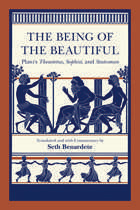
“The translations are masterpieces of literalness. . . . They are honest, accurate, and give the reader a wonderful sense of the Greek.”—Drew A. Hyland, Review of Metaphysics

In 1912 a young scholar published a slim volume investigating the social structure of the late Roman Republic, which was in due course to transform the study of Roman history. The author, Mattias Gelzer, went on to hold the Chair of Ancient History at Frankfurt and to become the greatest German-speaking historian of the Roman Republic since Mommsen. In 1921 he published his Caesar, which has by now gone through six editions in Germany and is still the standard account, in any language, of Caesar and his age. It amply fulfills the author’s intent “to give the educated public a lively picture of the complete political career of one of the great statesmen of the past.”
Based on a conscientious evaluation of the abundant source materials—primarily the writings of Caesar and his contemporaries—Professor Gelzer’s portrait renders Caesar in heroic proportions, destined and determined from the beginning to overthrow a corrupt aristocracy. The sixth edition (1960), brought up to date and provided with full annotations by the author, is the basis of this translation, which for the first time makes the work available in English.
With Professor Gelzer’s approval, some minor errors have been corrected, both in the text and in the chronological table and the map at the end of the book, and an analytical index of names has been added.
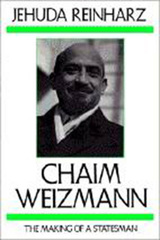
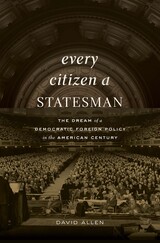
The surprising story of the movement to create a truly democratic foreign policy by engaging ordinary Americans in world affairs.
No major arena of US governance is more elitist than foreign policy. International relations barely surface in election campaigns, and policymakers take little input from Congress. But not all Americans set out to build a cloistered foreign policy “establishment.” For much of the twentieth century, officials, activists, and academics worked to foster an informed public that would embrace participation in foreign policy as a civic duty.
The first comprehensive history of the movement for “citizen education in world affairs,” Every Citizen a Statesman recounts an abandoned effort to create a democratic foreign policy. Taking the lead alongside the State Department were philanthropic institutions like the Ford and Rockefeller foundations and the Foreign Policy Association, a nonprofit founded in 1918. One of the first international relations think tanks, the association backed local World Affairs Councils, which organized popular discussion groups under the slogan “World Affairs Are Your Affairs.” In cities across the country, hundreds of thousands of Americans gathered in homes and libraries to learn and talk about pressing global issues.
But by the 1960s, officials were convinced that strategy in a nuclear world was beyond ordinary people, and foundation support for outreach withered. The local councils increasingly focused on those who were already engaged in political debate and otherwise decried supposed public apathy, becoming a force for the very elitism they set out to combat. The result, David Allen argues, was a chasm between policymakers and the public that has persisted since the Vietnam War, insulating a critical area of decisionmaking from the will of the people.
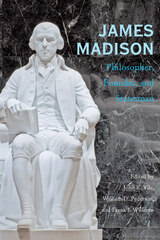
James Madison: Philosopher, Founder, and Statesman presents fresh scholarship on the nation’s fourth president, who is often called both the father of the U.S. Constitution and the father of the Bill of Rights. These essays by historians and political scientists from the United States and abroad focus on six distinct aspects of Madison’s life and work: his personality and development as a statesman; his work at the Constitutional Convention of 1787 and contributions to larger constitutional design; his advocacy for the adoption of the Bill of Rights; his controversial role as a party leader; his presidency; and his life after leaving office.
James Madison continues to be regarded as one of America’s great political theorists, a man who devoted his life to, and who found fulfillment in, public service. His philosophical contributions remain vital to any understanding of the modern American polity. This book will be of great interest to political scientists and theorists, as well as to historians of early American history and politics.

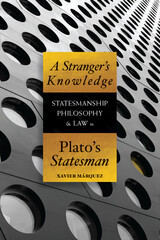
Marquez shows how this impasse is the key to understanding the ambiguous reevaluation of the rule of law that is the most striking feature of the political philosophy of the Statesman. The law appears here as a mere approximation of the expertise of the inevitably absent statesman, dim images and static snapshots of the clear and dynamic expertise required to steer the ship of state across the storms of the political world. Yet such laws, even when they are not created by genuine statesmen, can often provide the city with a limited form of cognitive capital that enables it to preserve itself in the long run, so long as citizens, and especially leaders, retain a “philosophical” attitude towards them. It is only when rulers know that they do not know better than the laws what is just or good (and yet want to know what is just and good) that the city can be preserved. The dialogue is thus, in a sense, the vindication of the philosopher-king in the absence of genuine political knowledge.
READERS
Browse our collection.
PUBLISHERS
See BiblioVault's publisher services.
STUDENT SERVICES
Files for college accessibility offices.
UChicago Accessibility Resources
home | accessibility | search | about | contact us
BiblioVault ® 2001 - 2024
The University of Chicago Press









